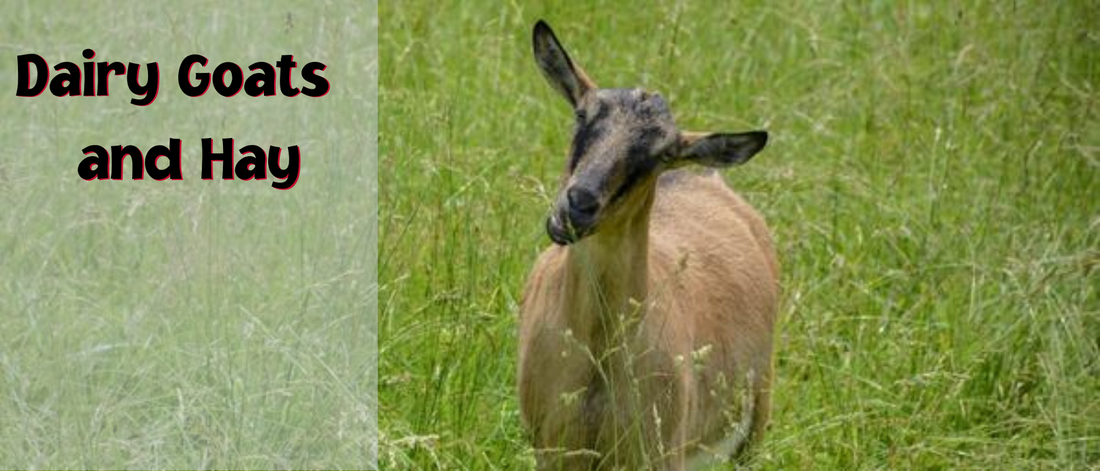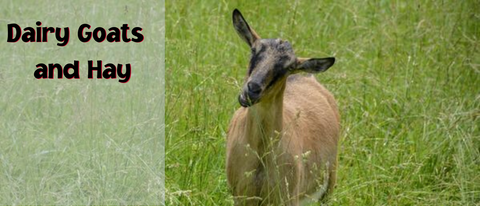
Dairy Goats and Hay
Share
Hay is absolutely essential for dairy goats. They need the roughage to keep their rumens functioning properly. Some people choose to not feed hay during the summer months while their goats are on summer pasture, but at Goat Milk Stuff, our goats get free-choice hay year-round because I want the dry material in their rumens in addition to the wet pasture they are eating.
Hay Type.
Consistency is what we try to achieve the most with our goats. That includes their care and their feed. Because we do not have continuous access to good quality alfalfa hay, we choose to feed good quality grass hay. Find a hay that you can consistently feed your goats. Don't switch from alfalfa hay one month to clover hay another to grass hay another. Work with a farmer to make sure he or she can meet your annual hay needs every year.
Square or Round.
Round bales are generally more economical than square bales. But they are also more difficult to move and to store. At Goat Milk Stuff, we mainly feed just square bales because we don't have a tractor to move round bales and because we don't have a place to store round bales out of the rain.
We do periodically get round bales if a local farmer has an abundant hay crop and is willing to bring the round bales to us and place them in the fields where we want them. We prefer them to be wrapped in plastic to offer some protection from the rain.
Weight of Bales.
All square bales (and likewise all round bales) do not weigh the same. Many a beginning goat farmer wastes money because they think that all bales weigh the same. When purchasing hay, make sure you ask the farmer what the weight of the bales are so that you can get an estimate of what the hay is actually costing you. At Goat Milk Stuff, we prefer 50 pound bales because they are easier for the younger children to move. If we get 75 pound bales, it takes some of the bigger children.
While we are talking about the differing weight of bales, make sure that your hay storage (if it is a loft) can support the weight of your hay. We had to reinforce our hay loft because we underestimated the weight of the hay we would store there.
How much hay.
Determining how much hay you need is always a challenge because it depends on a lot of factors. Let me be very clear - you do NOT want to run out of hay. It is always better to store extra because you can use any old hay for bedding.
If you own goats long enough, you will eventually experience a drought year where there is little hay available (and what is available is extremely expensive). People end up trucking in hay from across state lines. Hay prices skyrocket and it becomes a real problem. I always recommend that you try to keep 2 years of hay stored. In most years, you won't need that backup, but when you do, your goats (and your pocketbook) will thank you for it.
There is no great rule of thumb for how much hay you need because it depends on so many factors. How much waste do you have for your hay? I've heard of people whose goats are wasting up to 50% of their hay. You can do your best to minimize this waste by having good hay mangers, but there will always be waste. How leafy or stemmy is your hay? Goats generally prefer the leafy parts and will eat more of that. What else are you feeding? How much do your goats weigh? How cold is the winter? More hay generates more heat and helps keep your goats warm from within. Are you using your hay for bedding as well as eating? How long is your winter?
All of these affect how much hay you are going to need stored.
One rule of thumb says 1 square bale per goat per week. Again, there are a lot of factors, but if you have absolutely no idea how much hay you need, start there and keep track. I've said it before, write it all down, because you will forget how many bales you had and how long they lasted. If you keep track of it, you will thank yourself later. That estimate would be on the high side for us, but we feed free-choice alfalfa pellets, so our goats don't eat as much hay as if we didn't feed that. If all you are feeding is alfalfa hay, that might be a low estimate for you.
Another rule of thumb says that goats will eat 5 pounds of hay per day (not counting what they waste). Again, there are a lot of factors that would affect this, but you can use that as a starting point if you have no idea how much you need.
As always - estimate what you think you need and then get some more.
Moldy Hay.
There is very good quality hay out there and very bad quality. A good farmer knows when to cut the hay for the optimum nutrition and how to bale it and store it so it stays safe. Unfortunately, not all farmers have high quality hay.
Moldy hay can kill your goats.
So make sure you get quality hay from a good farmer. If you discover moldy hay, throw it away or compost it, but it's not worth the risk of feeding it to your goats. And don't use it as bedding because goats eat their bedding all the time.
Old Hay.
Old hay (that isn't moldy or too dusty), is still good to feed to goats. Just know that it will have lost some of its nutrition, so make sure they are getting plenty of other good feed. At Goat Milk Stuff, we tend to use old hay as bedding or to put down on muddy areas of the property where we are trying to get grass to grow if we've had extremely wet weather. It's also great to use for composting for your garden (but make sure it is completely composted so you kill any seeds).
How Much to Feed.
When you have more than 1 dairy goat (which you should), it's hard to determine that each goat is having its needs met unless you free-choice. The larger your goat herd, the more important this is. As I've mentioned before, at Goat Milk Stuff, we make hay available free-choice.
Be careful with limiting feed to save money. You are better off keeping fewer goats. You may not see the problems from limiting feed right away - but nutritional deficits build up and will lead to sick goats and bad birthing outcomes eventually.
Disclaimer: This information is provided as an example of how we personally raise goats at Goat Milk Stuff. We are not veterinarians and any information on the GMS website should not be taken as veterinary advice. Please seek the advice of a professional vet before making any changes to your herd management or individual treatment of your goat.
